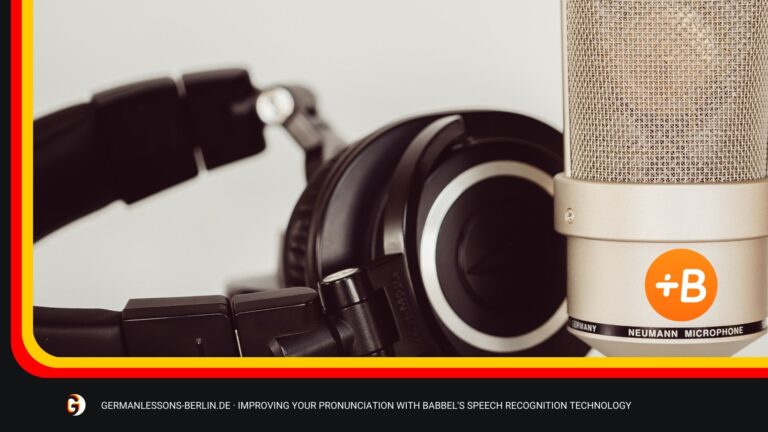Are you looking to improve your German pronunciation in just 30 days? If so, you’ve come to the right place! I’m here to share my best tips and tricks on how to get your German accent down pat within a month. It might seem like an impossible task at first, but with dedication and practice it can be done.
In this article, I will walk you through all the steps needed for improving your German pronunciation in just 30 days. You’ll learn about basic grammar rules, common mistakes that people make when speaking German, and strategies for practicing every day using simple tools available online. With these insights and exercises, you’ll be able to master those tricky consonants and vowels in no time!
By following these guidelines closely over the next 30 days, you’re sure to see amazing progress in your German accent. So let’s get started – are you ready to take on the challenge of perfecting your German pronunciation?
Table of Contents
Definition
I’m sure you’re wondering what it takes to improve your German pronunciation in just 30 days. First, let’s start by defining some key terms so we can have a better understanding of the meaning behind each one. German is a language spoken by millions around the world and learning its definition can help us grasp how to effectively speak it aloud with the correct pronunciation. Learning this language also means gaining an insight into its culture and customs, which adds another layer of understanding for those wanting to become fluent. Understanding the definition of pronunciation will help us understand why certain sounds are made when words are spoken in German and why they matter for speaking properly. Lastly, having an understanding of the meaning behind each word will provide context as to why specific letters or combinations of them should be pronounced differently by English speakers. Now that we’ve discussed definitions, let’s move on to the basic rules of pronunciation!
Basic Rules Of Pronunciation
Learning how to improve your German pronunciation in just 30 days starts with understanding the basic rules of pronunciation. These are essential for mastering a foreign language like German, as they help you become familiar with its sounds and rhythms. By following these basic rules, you’ll be able to speak more clearly and confidently when communicating in the German language.
One important rule is that there are three major vowel combinations: short, long, and diphthong vowels. Short vowels occur when one letter indicates one sound (e.g., ‘i’ = ‘eh’). Long vowels happen when two letters indicate one sound (e.g., ‘ee’ = ‘ay’). And diphthongs involve two different sounds combined into one syllable (e.g., ‘ei’ = ‘eye’). Knowing these distinctions will enable you to pronounce words correctly by focusing on each individual sound within them.
Another key rule is that certain consonants will change their pronunciation depending on whether or not they’re followed by a vowel or another consonant. For example, the ‘ch’ should always be pronounced as a hard k if it’s followed by a consonant or at the end of a word (e.g., Buch). But if it’s followed by a vowel then it has an sh-like sound (e.g., Bach). Having this knowledge can make all the difference between speaking fluently and having difficulty being understood!
Now that we’ve looked at some basic rules of pronunciation, let’s take a closer look at how slight changes in words can result in different meanings…
Different Ways Of Saying The Same Word
Improving your German pronunciation in just 30 days is a very achievable goal. With the right techniques and resources, you can quickly become more confident speaking German with improved clarity and precision. One of these key techniques involves learning different ways to say the same thing. Varying your pronunciations will help you get accustomed to the various sounds that make up the language, giving you an edge when it comes to communicating clearly.
To give you a head start on exploring alternative pronunciations for words, here are some tips:
- Listen carefully – When listening to native speakers or recordings of spoken German, pay attention to how they vary their intonation and stress certain syllables over others. This will help you understand which variations sound most natural.
- Experiment with tongue twisters – Tongue twister drills is great for helping build muscle memory so that you can accurately reproduce the sounds of the language without having to think about them too much. Try out phrases like “Sechs schwäbische Schützen schossen sechs schwarze Schwäne” (Six Swabian shooters shot six black swans) for practice!
- Practice articulation training – Articulation exercises are designed to help improve your pronunciation by focusing on specific groups of speech sounds such as vowels and consonants. You can find plenty of online tutorials and videos that walk through different types of exercises step-by-step.
By taking advantage of these tactics, you’ll be able to experiment with different ways of saying things in German while also honing your ability to recognize what makes one variation better than another. As your ear becomes more attuned to subtle nuances in pronunciation, you’ll be well on your way toward improving your overall fluency in no time at all!
Articulation Training
I’m sure you’re excited to start improving your German pronunciation! To do that, the first step is articulation training. Articulation drills are designed to help you become aware of mouth movements and how they affect pronunciation when speaking a language. With regular practice, these exercises will help build up muscle memory in your mouth so that it becomes second nature for you to say words correctly without having to think too much about them.
To begin an articulation drill, find something like a mirror or even just a wall and stand facing it while practicing different sounds. Make sure you pay close attention to the position of your lips and tongue as you make each sound. This will also help with accent reduction because if you can master the correct way of forming each sound then naturally your overall accent should improve accordingly too.
The best way to get started on this type of exercise is by repeating short phrases or sentences out loud until you feel comfortable with the pronunciation. You could also try recording yourself saying certain words or phrases and playing it back afterward for extra feedback on areas where there might be room for improvement. With consistent practice over time, I’m confident that soon enough you’ll see great progress in your German pronunciation skills!
Listen And Repeat Exercises
The key to unlocking your best German pronunciation lies in the practice of listening and repeating exercises. Just like a person needs to practice their swing to hit a golf ball farther or a musician practices scales on an instrument, you need to regularly practice listening and repeating phrases in order to perfect your German accent.
| Exercise | Difficulty | Time Required |
| Listen & Repeat Sentences | Easy | 15 minutes/day |
| Working with Vocabulary Lists | Medium | 20 minutes/day |
| Audio Comprehension Practice | Harder | 30 minutes/day |
By committing just thirty minutes each day for three weeks, you can drastically improve your German pronunciation skills through these simple yet effective activities. The table above outlines some of the most useful exercises that will help you boost your confidence when speaking German. From easy tasks such as listening and repeating sentences to more advanced ones such as audio comprehension drills – there is no shortage of ways to enhance your ability to speak fluently.
Whether it’s practicing everyday phrases or familiarizing yourself with new vocabulary words, allocating time every day towards improving your German pronunciation will bring great rewards over time. This consistent effort will be sure to pay off when it comes time for those once-in-a-lifetime conversations with native speakers!
Learn Common Phrases And Words
Learning common German phrases and words is essential for improving your pronunciation. It will help you to understand how the language works, which can then be applied to improve your intonation techniques. Here are a few tips on learning some of the most commonly used German phrases:
- Use flashcards or an app like Duolingo to learn vocabulary quickly and effectively.
- Listen to native speakers – watch videos online, listen to podcasts, attend classes, etc. This will give you a better understand of what correct pronunciation should sound like.
- Practice speaking with friends who speak German or find someone willing to practice with you.
By learning more about the language, it will become easier for you to pronounce words correctly. Focus on pronunciation when reading aloud in order to reinforce proper phonetics and focus on enunciating each syllable clearly. If possible, use a mirror while practicing so that you can observe yourself as well as hear your progress. Also, don’t forget to have fun! Learning doesn’t always have to feel tedious and boring; make it enjoyable by engaging in conversation with native speakers or singing along with audio recordings of popular songs in German. With enough dedication and effort, pronouncing German correctly won’t seem so daunting after all! Transitioning into the next section now we’ll talk about intonation techniques for improving your overall fluency in the language.
Intonation Techniques
Improving your German pronunciation starts with understanding intonation. It’s the rise and fall of your voice that helps bring life to the language. To make sure you’re getting it right, try out some intonation techniques.
When practicing intonation, record yourself speaking in German and listen back for any mistakes or mispronunciations. Pay attention to how the pitch of your voice changes throughout a sentence or phrase; if you don’t hear enough rises and falls, work on changing up the pitches more frequently when speaking. Also pay attention to sounds like ‘ah’ or ‘oh’, which should be longer than other sounds in order to mimic native speakers accurately.
You can also practice using exercises like saying tongue twisters, singing songs, reading aloud from books, listening to audio recordings of native speakers, and repeating after them as best you can. These will help you become familiar with intonation patterns so that they feel natural when you speak. Additionally, take note of tips such as emphasizing certain words within a sentence or lengthening important syllables—these are key aspects of perfecting your intonation levels!
With these helpful hints and regular practice sessions, you’ll be able to master German intonation in no time! Now is the time to start recording yourself speaking in German so that you can identify areas where improvement may be needed.
Record Yourself Speaking German
Believe it or not, you can drastically improve your German pronunciation in a mere 30 days! Recording yourself speaking is one of the most impactful steps to take when striving for clear and accurate German pronunciation. It allows you to pinpoint mistakes, analyze your progress and increase motivation by noticing improvements over time. Let’s delve deeper into how this works:
| Key | How-to | Benefits |
| Record Yourself Speaking | Make sure to record yourself frequently throughout each day. Speak out loud so that you can hear exactly what needs improvement. Listening will help you gain an understanding of where errors are occurring, such as word stress or vowel sounds. You may even want to set aside regular times throughout the week dedicated solely to recording yourself. This could be 5 minutes every morning or 20 minutes on Sunday nights – whatever fits best with your schedule! | By listening carefully and taking notes after each session, you’ll be able to identify patterns in your speech and better understand which areas need more focus. Over time and with practice, you’ll see marked improvements in both accuracy and confidence when pronouncing words correctly. Additionally, hearing yourself speak can help boost motivation as well as give feedback about how natural the language flow sounds compared to native speakers. |
Recording yourself speaking will allow you to develop strong intonation skills while also getting comfortable communicating in real-life conversations using correct grammar structures and vocabulary choices. Furthermore, practicing with recordings enables learners to craft their own personal style of communication while learning from mistakes quickly without fear of judgment from others.
By combining these techniques together – intonation drills combined with frequent recording -you can make huge strides toward achieving native-level German pronunciation within a month’s time! And if that wasn’t enough, the next step further cements your newfound mastery by putting it all into action through practice with native speakers
Practice With Native Speakers
Practicing with native speakers is one of the best ways to improve your German pronunciation. It’s a great way to get used to speaking the language in real-life conversation, as well as hearing it spoken correctly by other people. Here are some tips for getting started:
- Join a local group or meetup dedicated to learning and practicing German. This can be an excellent way to make friends who speak the language and practice with them regularly.
- Find online resources that offer audio recordings where you can hear native speakers talking in various accents and dialects. Listen carefully and try repeating what they say out loud until you become familiar with the sounds of each word.
- Take advantage of technology like Skype or Zoom so you can have virtual conversations with native German speakers from all around the world! You’ll learn different regional pronunciations while also having fun chatting about anything under the sun.
Not only will practicing with native speakers help you sharpen your pronunciation skills, but it’ll also give you more confidence when speaking German in any situation – whether it’s ordering food at a restaurant, making small talk at work, or just having an everyday conversation with someone new. To monitor your progress, keep track of how much time per day you dedicate to conversing in German and note down any words or phrases that are still giving you trouble.
Monitor Your Progress
I’m sure you’re excited to improve your German pronunciation in just 30 days. To make sure that you stay on track and achieve the results you want, it’s important to monitor your progress throughout the process. When we measure our progress, we can see how far we’ve come and what changes need to be made. This will help us stay motivated and continue making improvements.
Start by tracking your progress each day. Write down or record any new words you learn, phrases you practice, or sounds you are able to produce more accurately than before. You can also create a chart for yourself that shows where you started and how much progress you have made over time. This is an effective way of visualizing your journey so that you can keep pushing forward with confidence.
Finally, don’t forget to celebrate even the smallest successes! Every improvement should be celebrated as this helps reinforce positive behavior patterns and keeps our motivation levels high. Keep monitoring your progress regularly so that you can identify areas that require extra attention, allowing you to adjust accordingly and reach your goals faster!
Frequently Asked Questions
What Resources Are Available To Help Me Improve My German Pronunciation?
When it comes to improving your German pronunciation in just 30 days, the first step is knowing which resources are available. From audio recordings to online courses and apps, there’s plenty of help out there for those looking to reach their fluency goals. Whether you want to learn at home or take a class, these tips will guide you toward finding the most helpful german pronunciation resources.
Think of learning how to pronounce words in a foreign language like putting together pieces of a puzzle – with each practice session, more pieces fit into place. To make sure you don’t lose track of all that hard work, it’s important to find reliable sources on german pronunciation. Fortunately, online pronunciation resources can provide access to native speakers who can teach you the nuances of pronouncing words correctly. With this type of interactive support, it’ll be much easier for you to get comfortable speaking German quickly and accurately.
Finally, try using specific tools such as audio recordings or videos that feature native speakers talking about basic grammar topics as well as conversational phrases and idioms. This way, you’re not only getting valuable feedback from experts but also familiarizing yourself with real-world conversations so that when it’s time for you to speak up during an actual conversation, it won’t feel intimidating at all! You could even pair up with other learners and have weekly sessions where everyone takes turns reading aloud from books or articles written entirely in German – think of it as a fun practice that doubles as useful learning material!
No matter what methods work best for you when it comes to mastering proper german pronunciation, remember the key is consistency and regularity – if practiced regularly over time even just thirty short days can bring significant improvement!
How Can I Identify Areas Of My Pronunciation That Need Improvement?
Identifying the areas of your German pronunciation that need improvement can be a daunting task, especially if you want to do it quickly. However, with the right resources and tips, improving your German pronunciation in just 30 days is possible!
By using online tools such as language learning apps or audio recordings specifically designed for German pronunciation practice, you can identify where you have difficulty pronouncing certain words or sounds. You can even record yourself speaking and compare it to native speakers, so you know exactly what needs work. Additionally, look up how each letter should sound and remember keywords that will help you recall their respective pronunciations.
If all this feels overwhelming, don’t worry – there are plenty of other ways to improve your German pronunciation in no time. Try watching videos or listening to podcasts featuring native speakers. This will give you an idea of how they pronounce different words while also increasing your vocabulary at the same time. Finally, consider taking classes from a teacher who specializes in teaching foreign languages—they can provide personalized feedback on how to improve specific parts of your accent and pronunciation more effectively than any app or recording could.
No matter which approaches you to take, patience and dedication are essential for mastering German pronunciation in just 30 days. With some hard work and dedication, soon enough, you’ll be able to speak confidently with native Germans!
Will Practicing With Native Speakers Help Me To Improve My Pronunciation?
Do you dream of speaking German with perfect pronunciation? Have you ever wondered if it’s possible to make great strides in improving your German pronunciation in just 30 days? Well, I’m here to tell you that it absolutely is! And the key to making this happen lies in one simple practice – practicing with native speakers.
When it comes to learning a language properly, there’s no substitute for hearing and speaking with native speakers. Native speakers can help pinpoint areas where our pronunciation might be off, as well as provide feedback on what we could do better. When used correctly, this powerful tool can really turbocharge your progress toward improved german pronunciation.
Practicing with native speakers has far-reaching effects beyond the mere improvement of german pronunciation. It also helps us understand how words should sound when spoken, so they are intelligible and easy to comprehend. Furthermore, by listening carefully and attentively, we become more aware of subtle nuances like intonation, stress patterns, rhythm, and accents which all contribute to an overall understanding of the language.
With regular practice sessions with native speakers combined with self-study methods such as audio recordings or online courses – not only will you have plenty of opportunities to hone your skills, but you’ll also get real-time feedback from experts that can take your pronunciation improvement game up several levels!
How Long Will It Take Me To Achieve A Good Level Of German Pronunciation?
Improving your German pronunciation in a short amount of time can be daunting, but with the right preparation and practice, it is possible to achieve good results. It will take some dedication on your part, however, as there is no one-size-fits-all answer for how long it takes to learn perfect German pronunciation. Here are three key factors that will affect the length of learning time you need:
Your current level of understanding: If you already have an advanced knowledge of the language, then improving your pronunciation should come more quickly than someone who has never spoken any German before.
How often you practice: The frequency of practicing is essential when trying to improve your pronunciation skills. Listening to native speakers regularly and repeating aloud until you feel comfortable speaking will help you reach a good level quicker than if you do not put in dedicated practice time each week.
What techniques you use: Different strategies, such as focusing on mouth and tongue placement or paying attention to intonation, may work better for different people depending on their individual strengths and weaknesses when learning new languages. Finding out which technique works best for you can save valuable time when attempting to master correct pronunciation faster.
No matter how much experience you have with German and how hard you work at improving your accent, mastering accurate pronunciations will require patience and commitment from both teacher and student alike – only through consistent effort over an extended period of time can true fluency be achieved! With willpower, guidance from experienced instructors, and access to plenty of resources like audio recordings and videos featuring native speakers, anyone willing to invest the necessary hours into honing their skillset should see noticeable progress within 30 days or less.
Are There Any Tips On How To Better Remember German Words And Phrases?
I’m sure you’re wondering if there are any tips out there to help you better remember German words and phrases. Well, the answer is yes! With some smart memorization strategies and learning exercises, you can improve your pronunciation in just 30 days.
When it comes to mastering a language like German, being able to recall words and phrases quickly is essential for improving your pronunciation. To do this effectively, try breaking down each word into syllables or single sounds, as well as making associations with English words. You could also use flashcards to practice recalling vocabulary. This method can be especially useful when it comes to remembering verb conjugations and their corresponding tenses.
One great way of furthering your understanding of the language is by doing exercises that involve listening, speaking, and writing in German regularly. For instance, why not listen to podcasts in German? Or watch films without subtitlesDoing these kinds of activities will put what you have learned into context and allow you to become more confident using the language on a daily basis. Additionally, practicing reading aloud from books written in German can help immensely, too – it may feel awkward at first, but soon enough, you’ll find yourself sounding much more natural when pronouncing unfamiliar terms.
In short, there are plenty of ways that you can get better at memorizing new vocabulary and advancing your knowledge of the language’s grammar structure while simultaneously perfecting your pronunciation skills. With dedication and hard work coupled with these helpful tips mentioned above, I’m confident that after 30 days, you will have made significant progress towards achieving better fluency in German!
Conclusion
As someone learning the German language, it can be daunting to think of improving your pronunciation in just 30 days. However, with dedication and the right resources, you can make incredible progress in a relatively short amount of time. With consistent practice and an openness to feedback from native speakers, you will find yourself making noticeable improvements within weeks.
The journey may not always be easy but there are plenty of tips and tricks available to help you along the way. Utilize online tools such as YouTube tutorials or apps that help with word memorization. Additionally, immersing yourself in conversations with native speakers is essential for truly mastering pronunciation and intonation patterns.
With commitment and consistency, you can achieve great things over a period of thirty days! You’ll be amazed at how far you come when armed with enthusiasm and determination. Don’t forget to take breaks during this process—learning a new language takes time and effort so reward yourself for every small win!








